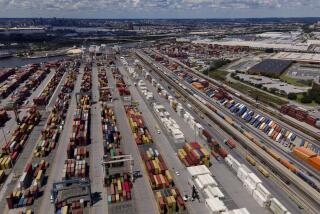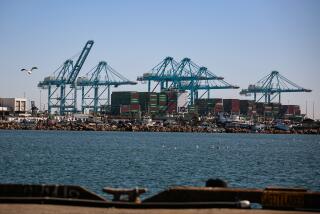West Coast ports facing shutdown in labor dispute
Each year, about 40% of the containers that come into the U.S. — filled with TVs, iPhones and clothes — passes through the twin ports of Los Angeles and Long Beach, making them the busiest in the nation and an economic engine for the Southland.
Now, after months of crushing congestion that has left the Long Beach coast cluttered with cargo ships waiting to unload, the ports, and 27 others along the West Coast, may be on the verge of shutting down, potentially imperiling the nation’s trade with Asia and putting a dent into the regional economy.
Fears of a shutdown increased Friday. The Pacific Maritime Assn., an employer group representing shipping lines that has been locked in bitter contract talks with West Coast dockworkers for nearly nine months, said it would temporarily stop unloading ships this weekend because it doesn’t want to pay overtime to workers who it says have been deliberately slowing down operations.
Earlier this week, Pacific Maritime Assn. President Jim McKenna said the docks are so congested that by next week the ports could become inoperable, leading the employers to shut down operations. A shutdown would have an immediate effect on port-related businesses such as truck operators and storage facilities.
“It’s going to hurt a lot of people,” international trade expert Jock O’Connell said. “Blue-collar workers ... in the supply chains in the Inland Empire. They are most vulnerable.” Some of those Inland Empire warehouse workers, who get an hourly wage, would simply be sent home, he said.
A protracted shutdown could be devastating to companies locally and across the country that rely on the West Coast gateways to receive merchandise and parts vital to run their businesses.
“This could have serious impact on the economy,” said Jonathan Gold, vice president of supply chain and customs policy at the National Retail Federation. “The escalating rhetoric, the threats, the dueling press releases and the inability to find common ground between the two sides are simply driving up the cost of products, jeopardizing American jobs and threatening the long-term viability of businesses large and small.”
Economists, however, don’t see a shutdown stretching for long and imperiling the economy in Southern California and the nation. During a 2002 lockout, the ports reopened after 10 days as President George W. Bush invoked the rarely used Taft-Hartley Act, citing threats to the national economy.
“If they close right now for 10 days ... the economic impact [in Southern California] would be serious and painful, but manageable,” said Sung Won Sohn, a Cal State Channel Islands economist and former Port of Los Angeles commissioner.
But “in a couple of months, it would be unbearable,” he said.
President Obama has not said what he would do if the ports are shut down. On Friday, White House spokesman Frank Benenati said that “this dispute is up to the two parties to resolve at the bargaining table, and we urge them to do so as expeditiously as possible. We continue to closely monitor the situation.”
McKenna, the head of the port employer group, said Wednesday that negotiations had reached a “critical” juncture and called on the union to accept what he called an “all-in” five-year proposal that increases pay and pensions. The union has not publicly said what it wants in the new contract.
The union, however, has said the congestion stems from industry-wide changes such as the increased use of mammoth container vessels and a shortage of trailers that truckers use to haul goods from the ports.
Robert McEllrath, president of the International Longshore and Warehouse Union, has called the threats of a shutdown “reckless and irresponsible” and said there are only a few issues remaining that can be “easily resolved.”
Tony Scioscia, a shipping consultant and former Pacific Maritime Assn. board member, said the 2002 lockout was so painful for both the shipping industry and the union that he thinks a work stoppage will be avoided this time around. After the 2002 lockout, it took West Coast ports 100 days to return to normal operations, he said.
“It’s a hairy point here, but I think sooner or later senses will prevail at the table,” Scioscia said.
Meanwhile, business owners like Michael Amini have seen their sales drop. His company, Amini Innovation Corp. in Pico Rivera, which imports furniture from China, has lost millions of dollars from cancellations and lost sales because of the brutal delays.
If the ports shut down, “it would paralyze us,” he said.
Twitter: @khouriandrew
Times staff writer Kathleen Hennessey in Washington contributed to this article







